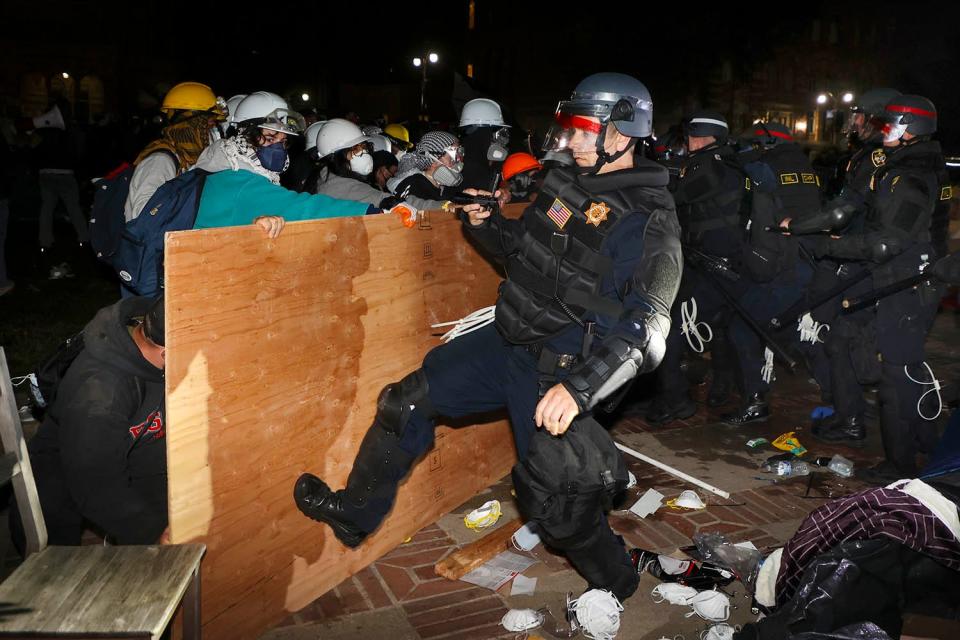WASHINGTON ― President Joe Biden and former President Donald Trump clashed this week over Palestinian protests that erupted on college campuses, signaling vastly different messages for the 2024 election.
In a speech Thursday at the White House, Biden tried to strike a balance on the nationwide campus chaos, arguing the U.S. must respect peaceful protest while making clear “violent protest is not protected.”
Biden’s address followed days of attacks from Trump on the demonstrators. The president’s remarks underscored the delicate line Biden is walking to keep intact the Democratic coalition, including young voters protesting the war in Gaza, while not wavering from his support for Israel.
“There’s the right to protest, but not the right to cause chaos,” Biden said.
More: President Biden breaks silence on campus unrest: ‘Violent protest is not protected’
Trump, between appearances this week in a New York courtroom for his hush-money trial, struck a very different tone, encouraging the police crackdowns at Columbia University, University of California, Los Angeles, and other colleges across the nation. He went a step farther than Biden in his law-and order messaging, celebrating the police crackdown as “a beautiful thing to watch.”
Trump, the presumptive Republican nominee, is working to tie Biden to the chaos and destruction on colleges in an appeal to undecided independent voters, suburban voters and moderate Republicans unsure about backing Trump.
“These are radical left lunatics, and they’ve got to be stopped now,” Trump said of the protesters before his court appearance Thursday.
Colleges protests presented Biden with no good options politically
For days leading up to Biden’s most extensive remarks on the protests, Trump taunted Biden about his silence on the images of destruction on college campuses.
Biden subtly struck back Thursday.
“In moments like this, there are always those who rush in to score political points,” Biden said, without mentioning Trump by name. “But this isn’t a moment for politics, it’s a moment for clarity.”
The wave of college protests presented Biden with a dilemma: Speaking out forcefully against the protests and applauding actions of university leaders and police could further alienate himself with young voters, a key Democratic constituency. But defending the rights of the protesters feeds new lines of attack to Trump and Republicans, who want to pin the national unrest on Biden.
In the end, Biden tried to have it both ways ― saying enough is enough with the violence, but standing up for the right to peacefully protest. Biden also condemned antisemitism that’s surfaced at some protests, while also denouncing “Islamophobia” and discrimination against Arab Americans.
“We are not an authoritarian nation where we silence people or squash dissent,” Biden said. “But neither are we a lawless country. We are a civil society, and order must prevail.”
Two of Biden’s most telling remarks came after his prepared speech was over. Asked by a reporter whether the protests have forced him to reconsider his policy on Israel, Biden responded, “No.”
And asked whether he believes the National Guard needs to intervene in protests − like some Republicans have demanded − Biden also said, “No.”
Trump uses college protests to downplay Jan. 6 attacks
Similar to the George Floyd protests of 2020, Trump and Republicans have pointed to the pro-Palestinian protests on college campuses to paint Biden and Democrats as beholden to the far left and unwilling to enforce the law.
More: Who will Donald Trump choose as his running mate? What to know as potential VPs gather in Florida.
Speaker Mike Johnson traveled last week to Columbia University to seize on the protests, while other House Republicans this week made the short trip to George Washington University, another site of pro-Palestinian protests.
During a rally in Wisconsin on Wednesday − an off day for the trial − Trump said: “The radical extremists and far-left agitators are terrorizing college campuses, as you possibly noticed, and Biden’s nowhere to be found; he hasn’t said anything.”
White House press secretary Karine Jean-Pierre rejected any notion that criticism from Trump prompted Biden’s speech. “When it comes to something like this, he doesn’t need to follow anyone,” Jean-Pierre said.

With this year’s protests, Trump has also argued there’s a double standard for liberals and conservatives.
Trump has suggested that officials might not prosecute the kinds of demonstrators who took over, barricaded, and vandalized a building at Columbia.
Trump is also using the violence to downplay the attack on the Capitol on Jan. 6, 2021, in which his supporters stormed the U.S. Capitol in Washington, D.C., in a failed effort to block certification of President Joe Biden’s victory in the 2000 election.
In condemning the college demonstrators, Trump said this week: “I wonder if what’s going to happen to them will be anything comparable to what happened to J6, because they’re doing a lot of destruction, a lot of damages, a lot of people getting hurt very badly.”
He added: “I think I can give you the answer right now … and that’s why people have lost faith in our court system.”
In response, Biden campaign spokesman James Singer said Trump has cheered on Jan. 6 and other right-wing protesters for years. Trump is “a chaotic, hateful, and divisive figure who fans the flames to turn Americans against each other.”
This article originally appeared on USA TODAY: Biden vs. Trump on college campus protests: What they’ve said


